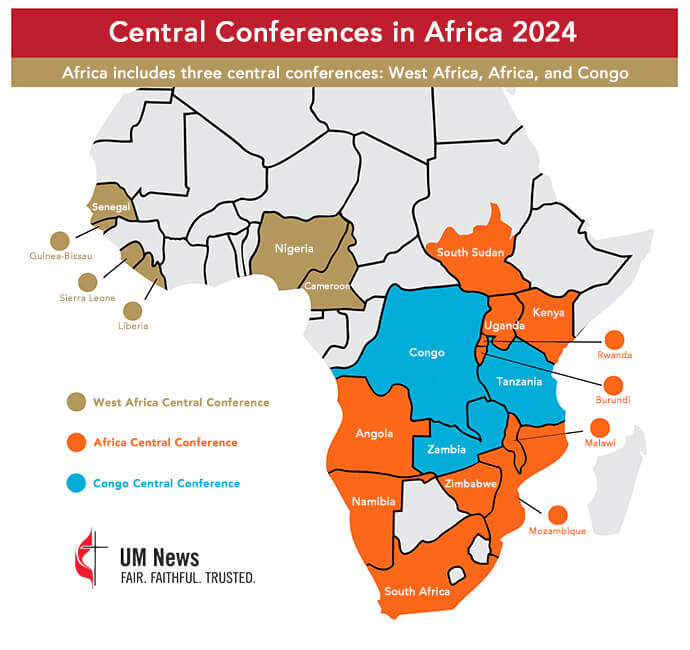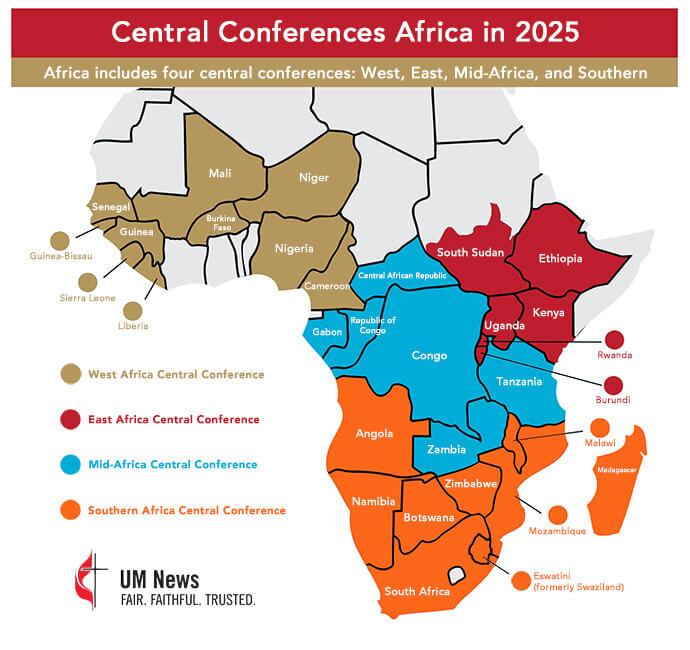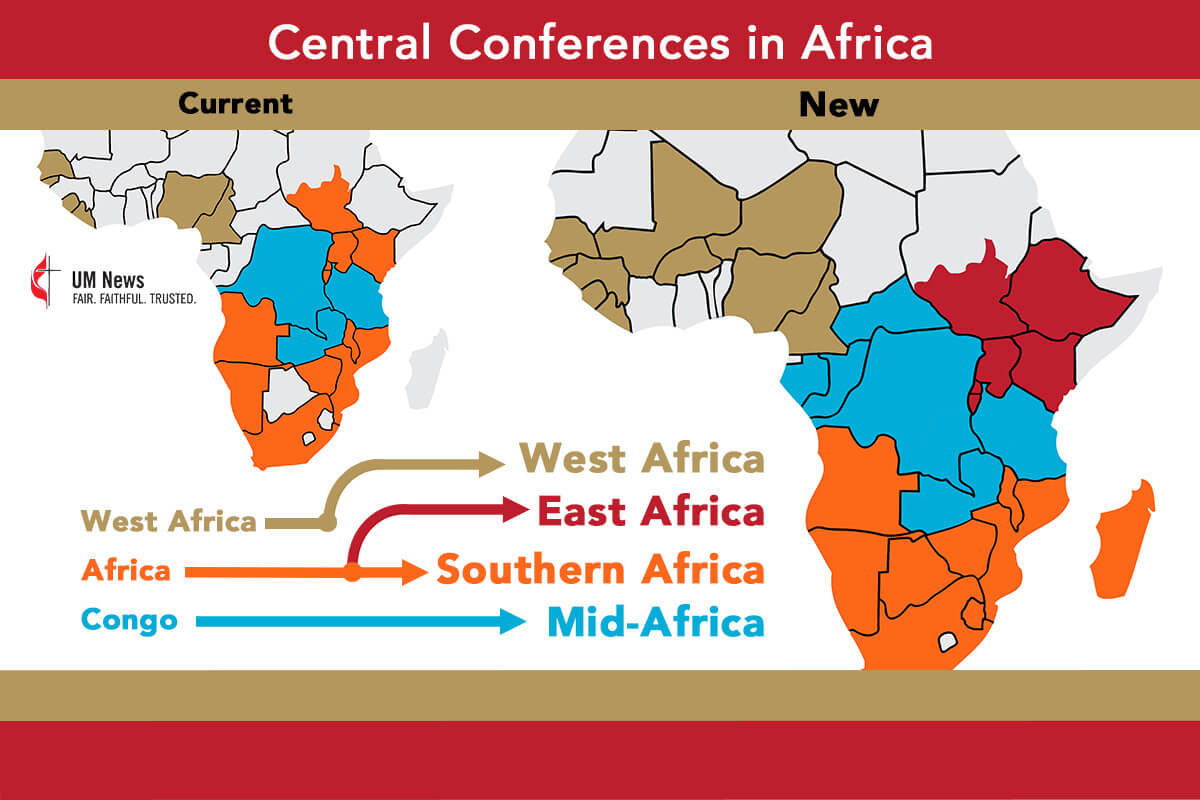Key points:
- Four United Methodist central conferences are scheduled in the coming months.
- That includes the Africa Central Conference, which will make history when it meets March 13 by splitting into two central conferences.
- The coming sessions are expected to elect a total of eight new bishops.
This month, United Methodists will participate in a development not seen in almost 30 years: the addition of a central conference.
Central conferences are United Methodist regional bodies in Africa, Europe and the Philippines that typically meet every four years to elect bishops and adapt parts of the Book of Discipline, the denomination’s policy book, to their missional context. Each central conference consists of multiple annual conferences, which are the basic organizing body of The United Methodist Church.
Four central conference sessions are scheduled in the coming months. By the time those meetings conclude in July, The United Methodist Church expects to have an additional eight new bishops and a whole new map.
Previously, the Germany Central Conference elected Bishop Werner Philipp; West Africa elected Bishops Ande Ikimun Emmanuel and James Boye-Caulker; and the Philippines re-elected Bishops Rodel M. Acdal, Ruby-Nell M. Estrella and Israel M. Painit.
The upcoming changes include increasing the number of central conferences from three to four on the African continent, resulting in a total of eight United Methodist central conferences around the world.
Congo Central Conference gets new date
As war intensified in eastern Congo, United Methodist leaders faced a difficult decision: How to conduct church business while keeping everyone safe.
The Congo Central Conference, originally scheduled for March 30 to April 4 in Kindu, is now set for July 10 to 13 in Kitwe, Zambia. The central conference will officially be renamed the Mid-Africa Central Conference when it meets in July.
Bishop Gabriel Yemba Unda, Congo Central Conference College of Bishops president, announced the decision, which was made after intensive consultations between the college of bishops and the Council of Bishops.
The increase will help strengthen United Methodist ministry on a continent where the denomination’s presence has long been growing, said North Katanga Area Bishop Mande Muyombo, president of the Africa Colleges of Bishops.
“Such a reshape and addition of central conferences aligns with the cultural contextual realities as well as the proximity of annual conferences,” Muyombo said.
It also will involve turning one central conference meeting into two. At the end of the Africa Central Conference on March 16 in Johannesburg, the gathering’s delegates will form the East Africa and Southern Africa central conferences. The formation of the new central conferences is scheduled after bishop elections.
- The East Africa Central Conference will consist of the United Methodist presence in Ethiopia, Kenya, Rwanda, South Sudan and Uganda. The new central conference also will include Burundi, which after more than a decade of internal divisions, fully reunited with The United Methodist Church in 2018.
- The Southern Africa Central Conference will consist of the United Methodist presence in Angola, Botswana, Madagascar, Malawi, Mozambique, Namibia, Eswatini (formerly Swaziland), South Africa and Zimbabwe.
The last time The United Methodist Church formed a new central conference was in 1996, when General Conference — the denomination’s top legislative assembly — established what is now the Congo Central Conference, which also had previously been part of the Africa Central Conference.
Last year’s General Conference authorized the creation of the new central conferences as well as the addition of two new bishops on the African continent.
It also authorized renaming the Congo Central Conference as the Mid-Africa Central Conference, which will take effect when it meets. The central conference consists of the Central African Republic, Democratic Republic of Congo, Gabon, Republic of Congo, Tanzania and Zambia.
The number of African bishops will increase from 12 to 14, with a new episcopal area in East Africa and another in Mid-Africa.


It’s up to central conferences to determine the borders of their episcopal areas. But the legislation passed by General Conference recommends that the East Africa Central Conference create its new episcopal area in Burundi and the Mid-Africa Central Conference create its new episcopal area from parts of the North Katanga and South Congo episcopal areas.
Current plans call for the remaining central conferences to meet and elect bishops as follows:
- The Africa Central Conference will meet March 13-17 and elect four bishops. The East Africa Central Conference will have a total of two, and the Southern Africa Central Conference will have a total of four.
- The Central and Southern Europe Central Conference will meet March 13-16 and hold no elections. The central conference elected its sole episcopal leader, Bishop Stefan Zürcher, in 2022.
- Northern Europe and Eurasia Central Conference will meet April 2-6 and hold one election for the Nordic-Baltic-Ukraine Area. The Eurasia Episcopal Area, encompassing four annual conferences in Russia, Belarus, Kyrgyzstan and Kazakhstan, will depart the denomination early April 3, completing the journey to become an autonomous Methodist denomination. Delegates from Eurasia will only take part in the meeting online.
- The Mid-Africa Central Conference (formerly Congo Central Conference) will meet July 10-13 after needing to relocate and reschedule because of insecurity in eastern Congo. The conference plans to elect three bishops, for a total of five.
Each central conference will be able to thrive in its own context, Muyombo said. For example, East African United Methodists live in a multireligious environment, where maintaining good relations between Christians and Muslims is crucial to nation-building.
Subscribe to our
e-newsletter
“The East Africa Central Conference will allow annual conferences to exchange experiences in the areas of evangelism, church growth, health, education, food security and leadership development,” the bishop said.
Ultimately, Muyombo and his fellow bishops hope that annual conference voters will ratify the package of amendments to the denomination’s constitution called regionalization. Under regionalization, the church in the U.S. and each central conference would become regional conferences with the same authority to adapt the Book of Discipline. To be ratified, constitutional amendments need the support of at least two-thirds of all annual conference voters around the globe.
Voting is taking place through October. The Council of Bishops expects to tally all votes and certify any amendment ratifications at its fall meeting in early November.
“It is our hope these central conferences will soon be regional conferences that will work towards their sustainability and make regional decisions that will strengthen mission and ministries in the respective annual conferences,” Muyombo said.
Hahn is assistant news editor for UM News. Contact her at (615) 742-5470 or [email protected]. To read more United Methodist news, subscribe to the free UM News Digest.




